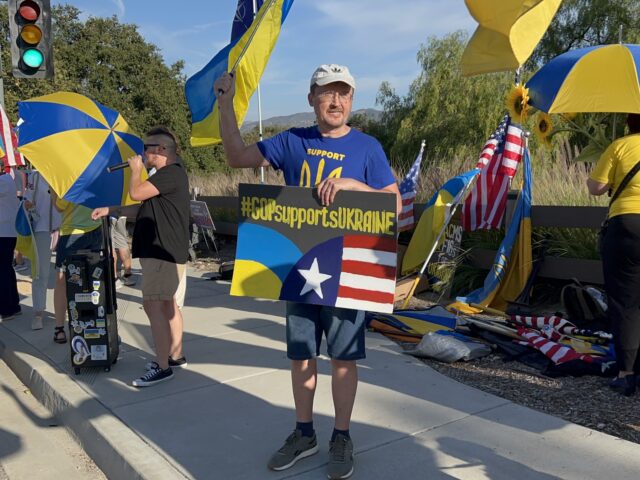I had a fascinating exchange Wednesday outside the Ronald Reagan Presidential Library with a protester who was there to support Ukraine — and who believes the war should continue, at any cost, until Russia leaves the Crimea.
Professor Gilbert Paul Carrasco of Willamette University in Oregon was there, outside the second Republican presidential primary debate, with about two dozen other protesters, urging bipartisan support for Ukraine.
The good professor was friendly, and agreed to speak on camera to Breitbart News. He admitted he was unlikely to vote for any of the Republicans onstage, even if they backed the war, due to their other “ass-backwards” policies.
He is clearly well-informed, and his interest in the issue is sincere: he is married to a Ukrainian with relatives in Ukraine. He answered my questions in a clear and competent manner. Still, I found his ideas rather troubling.
I began by asking Carrasco the simple question: what is your message to the GOP debate?
He answered that “we need rule of law and democracy in Ukraine. If it [Ukraine] falls, we are in danger of losing our own democracy, because Europe will be next.”
I could have asked him about the quality of Ukrainian democracy, which has instituted martial law, and where parliamentary elections have been postponed.
But I asked a different question: what would he say to voters who are worried about an open-ended conflict, with no “achievable outcome”?
After all, the so-called “spring counteroffensive” has failed to materialize, and the two sides seem to be unable to make much progress. Today, as Glenn Greenwald noted, the New York Times published a map showing how little territory has changed hands since the beginning of the year. It is much like the Western Front in World War I.
Amazing and sad chart from NYT on how virtually nothing has changed from 9 months of tragically deadly and expensive fighting in Ukraine throughout 2023:
Pink zones show parts of Ukraine occupied by Russia since January.
Blue shows gains by Ukraine. Red shows gains by Russia. pic.twitter.com/5y9oc7ZbOJ
— Glenn Greenwald (@ggreenwald) September 28, 2023
Carrasco replied that there was, in fact, an achievable outcome: “The defeat of Russia.”
How do you defeat a nuclear-armed power, I asked? He replied that we should not be intimidated by Russia’s “sabre-rattling.”
That didn’t quite answer the question, so I tried a different tack, later: what about the risk of World War III?
“Well, we’re always concerned about things … lightning could strike us right at this moment,” he said, under a blue sky.
Would he accept a negotiated peace? “As soon as Russia agrees to maintain the terirtorial integrity of Ukraine, as it existed before the invasion of Crimea and Donbas, I would say yes we can have peace talks, but not before.”
Was there a limit to the spending? “I think we have to support Ukraine as long as it takes, with as much as it takes.”
That is, essentially, the Democratic Party position: war until the “defeat” of Russia, or withdrawal from Crimea.
I was one of President Barack Obama’s critics in 2014, when he allowed Russia to invade Crimea; I was one of President Joe Biden’s critics in 2021, when he lifted sanctions on Russia’s Nord Stream 2 pipeline. I criticized Biden for holding a summit in Geneva with President Vladimir Putin before even meeting with Ukrainian President Volodymyr Zelensky. Russia invaded because Biden, and Obama before him, signaled a lack of American will.
But reality is a hard thing.
While most Americans supported efforts to help Ukraine thwart Russia’s invasion of Ukraine in the early weeks of the war, the conflict is now a stalemate with a massive cost and enduring risks.
President Biden, who came to office proclaiming, “Diplomacy is back,” has rejected any effort at talks to end the war, which is unlikely to end with any result other than Russia holding some territory in Russian-speaking regions.
In that regard, President Joe Biden missed a historic opportunity last week at the opening of the United Nations General Assembly, when he could have introduced a serious proposal for peace. He settled for more talk about standing up to “naked aggression” and deterring future aggressors.
But wise diplomacy that offers alternatives to war can be just as much of a deterrent: it can expand our options, and it can change the incentives of our enemies.
Carrasco is right that the Ukrainians are a resilient and courageous people. But Russia is not going to collapse, and there is diminishing support among Americans for what has been, until now, an open-ended commitment. Indeed, there is no other cause that separates the Beltway from the rest of the country quite like this one.
Better to try talks now, while Ukraine still has leverage, and residual bipartisan support.
All we are saying is: give peace a chance.
Joel B. Pollak is Senior Editor-at-Large at Breitbart News and the host of Breitbart News Sunday on Sirius XM Patriot on Sunday evenings from 7 p.m. to 10 p.m. ET (4 p.m. to 7 p.m. PT). He is the author of the new biography, Rhoda: ‘Comrade Kadalie, You Are Out of Order’. He is also the author of the recent e-book, Neither Free nor Fair: The 2020 U.S. Presidential Election. He is a winner of the 2018 Robert Novak Journalism Alumni Fellowship. Follow him on Twitter at @joelpollak.

COMMENTS
Please let us know if you're having issues with commenting.